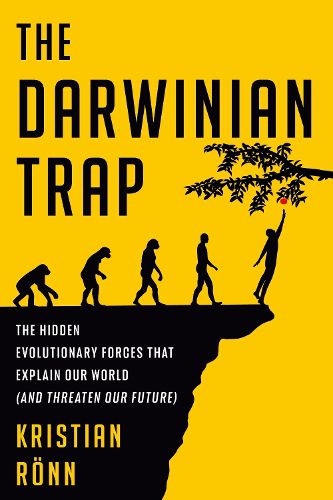Readings Newsletter
Become a Readings Member to make your shopping experience even easier.
Sign in or sign up for free!
You’re not far away from qualifying for FREE standard shipping within Australia
You’ve qualified for FREE standard shipping within Australia
The cart is loading…






A provocative exploration of how humans are wired to seek short-term success at the expense of long-term survival-an evolutionary "glitch" that explains everything from toxic workplaces to climate change
A provocative exploration of how humans are wired to seek short-term success at the expense of long-term survival-an evolutionary "glitch" that explains everything from toxic workplaces to climate change
"Essential reading . . . a lively, ultimately hopeful examination of how incentivizing the wrong values and actions has led to some of our most intractable problems."-Eric Ries, New York Times bestselling author of The Lean Startup
When people talk about today's biggest challenges-pollution, misinformation, artificial intelligence, inept CEOs, and politicians-they tend to frame the conversation around "bad people" doing "bad things." But is there more to the story?
Humans, it turns out, are intrinsically wired to seek short-term success at the expense of long-term prosperity. Kristian R nn, an entrepreneur formerly affiliated with the University of Oxford's Future of Humanity Institute, calls these deeply rooted impulses "Darwinian demons." These forces, a by-product of natural selection, can lead us to act in shortsighted ways that harm others-and even imperil our survival as a species. If this evolutionary glitch is left unchecked, the consequences will grow in magnitude as the power of technology accelerates.
In this eye-opening work, R nn shows that we must learn to cooperate in new ways if we are to escape these evolutionary traps in our daily lives and solve our biggest existential threats. Evolution may be to blame for the trap-but humans need not fall for it. Our salvation, he writes, will involve the creation of new systems that understand, track, and manage what humankind values most.
Bold, brilliant, and ultimately optimistic, The Darwinian Trap gives readers a powerful new lens on our world and its problems, and invites us to rethink our priorities for the sake of generations to come.
$9.00 standard shipping within Australia
FREE standard shipping within Australia for orders over $100.00
Express & International shipping calculated at checkout
A provocative exploration of how humans are wired to seek short-term success at the expense of long-term survival-an evolutionary "glitch" that explains everything from toxic workplaces to climate change
A provocative exploration of how humans are wired to seek short-term success at the expense of long-term survival-an evolutionary "glitch" that explains everything from toxic workplaces to climate change
"Essential reading . . . a lively, ultimately hopeful examination of how incentivizing the wrong values and actions has led to some of our most intractable problems."-Eric Ries, New York Times bestselling author of The Lean Startup
When people talk about today's biggest challenges-pollution, misinformation, artificial intelligence, inept CEOs, and politicians-they tend to frame the conversation around "bad people" doing "bad things." But is there more to the story?
Humans, it turns out, are intrinsically wired to seek short-term success at the expense of long-term prosperity. Kristian R nn, an entrepreneur formerly affiliated with the University of Oxford's Future of Humanity Institute, calls these deeply rooted impulses "Darwinian demons." These forces, a by-product of natural selection, can lead us to act in shortsighted ways that harm others-and even imperil our survival as a species. If this evolutionary glitch is left unchecked, the consequences will grow in magnitude as the power of technology accelerates.
In this eye-opening work, R nn shows that we must learn to cooperate in new ways if we are to escape these evolutionary traps in our daily lives and solve our biggest existential threats. Evolution may be to blame for the trap-but humans need not fall for it. Our salvation, he writes, will involve the creation of new systems that understand, track, and manage what humankind values most.
Bold, brilliant, and ultimately optimistic, The Darwinian Trap gives readers a powerful new lens on our world and its problems, and invites us to rethink our priorities for the sake of generations to come.